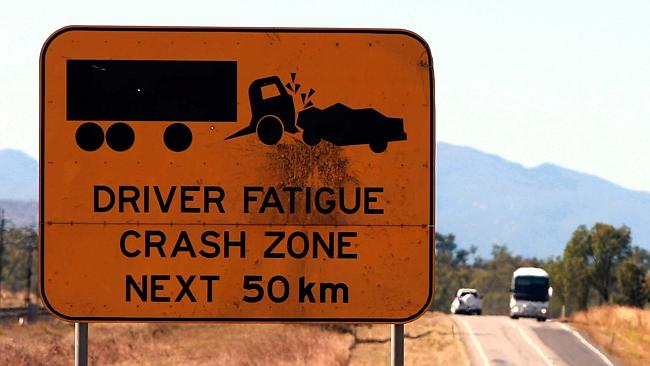POLICE have discovered cowboy truckies are exploiting a loophole in the law and driving for more than 16 hours a day.
The latest Victoria Police drug-testing figures also reveal those rogue operators are increasingly using stimulant drugs such as ice and speed to keep them awake so they can drive for excessively long periods.
Det-Insp Bernie Rankin, the head of the force’s transport investigations section, said one in 12 truck drivers targeted by police were now testing positive for drugs.
“There are some drivers who definitely use ice or speed to supposedly stay awake,” he told the Herald Sun.
Police conduct drug and alcohol tests on truck drivers in Whitehall St, Footscray.
“There are others who use such drugs in the course of their recreational pursuits and then get behind the wheel of a truck.
“To think that you can have a guy driving a semi-trailer for 16 hours a day without a break is ludicrous.
“Yet we are finding through our on-road checking regime that this is becoming more and more frequent.
“No motorist wants to share the road with these cowboys.”
Heavy vehicle drivers are supposed to only drive for a maximum of 12 hours a day.
“Drivers have worked out if they manipulate a small amount of work time into their work diary they can actually work 16.25 hours in a 24-hour period,” Det-Insp Rankin said.
“This manipulation of their work diary gives regulated heavy vehicle drivers the opportunity to drive in excess of their prescribed hours four times in a seven-day period and be non-prosecutable.
“This method of manipulating work diaries is now widespread through word of mouth.”
Det-Insp Rankin said the force was working with authorities to close the loophole to try to ensure truck drivers don’t drive for more than the permitted 12 hours a day.
He also revealed Victoria Police has just started a new fatigue testing program to try to stem the alarming increase in fatalities involving heavy vehicles.
“There were 59 fatalities involving heavy vehicles in 2014 — a 90 per cent increase over the previous year,” Det-Insp Rankin said.
“It’s important to note the truck drivers weren’t at fault in all of these collisions, but we are concerned illicit drug use and fatigue are contributing to the increase.”
Det-Insp Rankin said his team of investigators would now probe every crash involving a heavy vehicle, even if no one is injured, and would pay particular attention to determining if fatigue was a factor.
Previously only heavy vehicle accidents involving fatalities and injuries were looked at by the specialist team.
Det-Insp Rankin said the trucking industry was incredibly competitive, which led to some companies pressuring drivers to break or manipulate the rules so they could drive long distances quickly.
“We regularly work on cowboy companies that just have no regard whatsoever to the rules around fatigue and speed,” he said.
“Not only can the driver be held responsible, his employer can also be liable if we can demonstrate the driver has seriously breached the fatigue rules.
“There is no doubt there are operators who are finding it a very difficult market for them financially and that causes some of them to take short cuts to try to get an edge on their competitors.
“So we have people, often on drugs, driving these huge vehicles for hours and hours and hours.”
“We know there are smaller operators who will just have two drivers taking turns to drive and sleep in the back of the truck and they just go hell for leather from Melbourne to Perth or wherever it is they need to get to get to.”
Source: Herald Sun, 2015



Comments are closed.